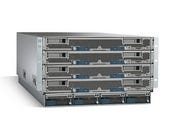Cisco's big, ambitious vision puts it in a brave new world of competition, one fraught with challenges and holes competitors are eager to pick at.

|
Cisco Unified Computing System with four UCS B-Series blades |
| |
|
With its Unified Computing System, Cisco laid out a vision to bring together computing power, networking, storage, and management into a single platform that includes integrated hardware and software from a variety of vendors.
It's a big, ambitious vision that puts Cisco in a brave new world of competition, one fraught with challenges and holes competitors are eager to pick at.
Hewlett-Packard -- which, along with IBM, is likely to be most affected by Cisco's announcement -- all but took credit for the vision Cisco laid out Monday. The company announced its ProCurve One system, a combined server and switch with its own partner ecosystem, in January. "What we heard pretty much validated where we're headed," Matt Zanner, HP ProCurve's worldwide director of data center solutions, said in an interview. "The whole idea of collapsing different infrastructures, that's a tenant HP's been claiming for quite some time."
HP and Cisco have a number of existing partnerships, as at various points HP has resold Cisco products and the two even integrated a Cisco switch with an HP blade server chassis. However, their competition has been ramping up significantly as HP's ProCurve networking arm has grown and now, in a possible death-blow to big partnerships, as Cisco moves into servers and pushes out HP in favor of BMC for management support. IBM and Cisco also have a strategic alliance and a number of jointly developed products.
HP will likely only increase the integration between its formerly isolated networking arm and the rest of the company's technology business, which joined in November. "There's been an immense amount of connection already," Zanner said. "The future just looks brighter and brighter with the possibilities for more integrated solutions for customers." While HP claims to have a partner coalition with its ONE system that anyone can join, Unified Computing, for all of Cisco's talk of being open, isn't. Cisco has brought together a who's who of vendors to fulfill product and technology areas where it lacks market penetration or products, like storage and virtualization. It has left out, not surprisingly, other networking equipment and server vendors.
In the short term, Cisco's Unified Computing vision requires partnerships to satisfy numerous requirements of a dynamic virtualized environment that aren't today standardized, including the automated ability to reliably move virtual machines from server to server. However, that means Cisco's system will only be open to official partners whose products have been certified and accredited as integrated with the UC platform.
"The evolution of the data center to a dynamic, fully virtualized state," Brocade said in a statement, "should leverage open architectures and industry standards." That being said, while Brocade helps its customers cobble together an architecture, some technologies like virtualization and converged networks use mainly pre-standard or proprietary architectures at this point, since standards bodies lag behind the key vendors.
Brocade, like other competitors, also pointed to the probable large investment Cisco's Unified Computing vision will force. Though customers could still start with a pilot of Cisco's platform, a data center overhaul would eventually require a rip-and-replace. Many companies struggling to scale back budgets in the face of the economic downturn are unlikely to be looking for a huge new investment. In an interview, Kevin Ryan, Extreme Networks' director of data center marketing, took aim at that massive investment of time and energy, pointing out that Extreme talks to its customers about how to make existing data center investments more efficient, not about replacing existing equipment.
InformationWeek Analytics has published an independent analysis of the challenges around virtualization management. Download the report here (registration required).
About the Author(s)
You May Also Like









